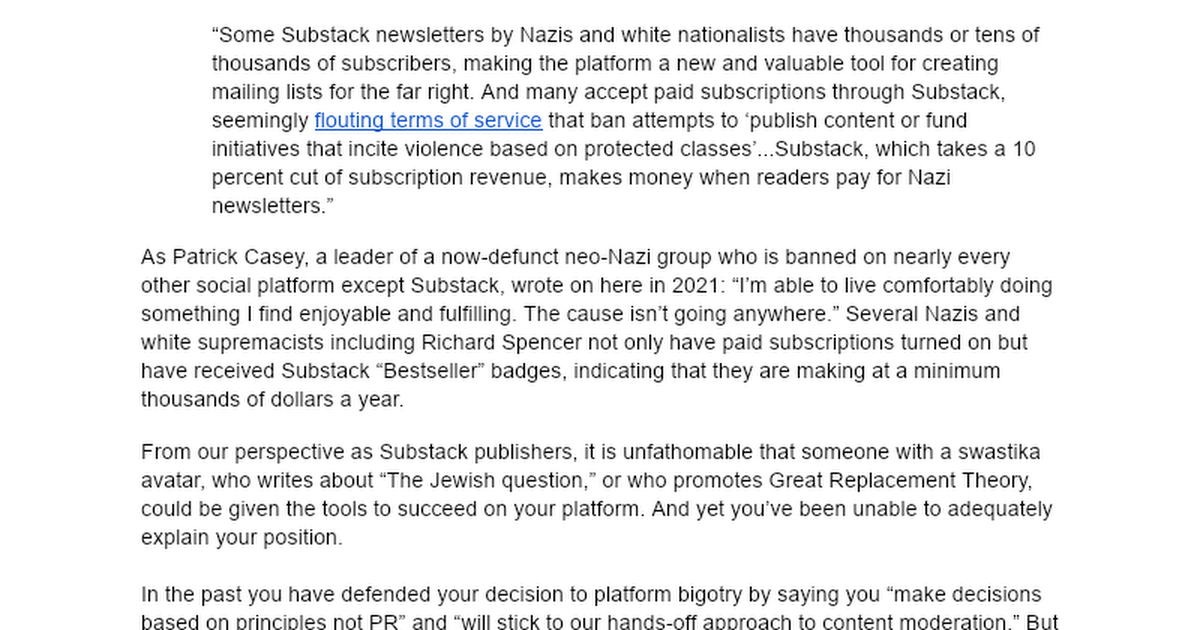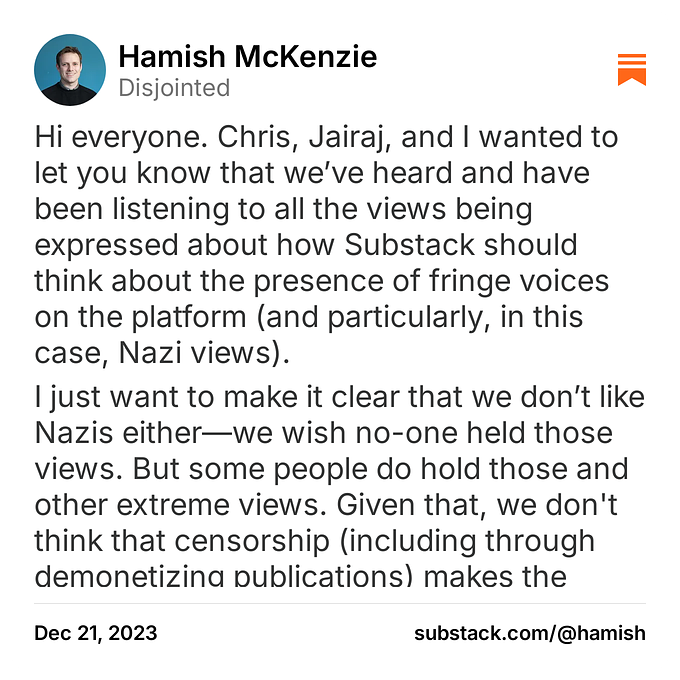Profit and Prejudice: Substack still has a Nazi problem
The Company continues to profit from hate.

I need to first apologize for my tone last week. I don't normally drink alcohol, but we are not in normal times; the vitriol I couldn't keep down anymore spilled onto the keyboard. I won't retract anything I said about the Felon or the support he receives from nation states actively committing genocide. This isn’t about the Felon, though—this is about the Company, which in this story is Substack.
I've never written for Substack and I only read a single newsletter about dumb shit, so admittedly, I was a bit out of the loop and even flustered as to why I was being criticized for sharing a link from the Company.
For the unfamiliar, Substack is an email newsletter platform that lets writers create, spread, and charge for their content. The Company takes a 10% cut on all subscription fees which helped them reach an estimated $29 million USD in revenue in 2023.
In true capitalist spirit, despite record breaking growth, the Company just couldn't say no to more money and to this day continues to earn revenue from pro-Nazi content on their platform. This isn't exactly a new trend, Jonathan Katz reported this problem in the The Atlantic last November:

In the article, Katz explains the problem isn't just that the Company is making money but also promoting these Nazi blogs:
Some Substack newsletters by Nazis and white nationalists have thousands or tens of thousands of subscribers, making the platform a new and valuable tool for creating mailing lists for the far right. And many accept paid subscriptions through Substack, seemingly flouting terms of service that ban attempts to “publish content or fund initiatives that incite violence based on protected classes.” Several, including [Richard] Spencer’s, sport official Substack “bestseller” badges, indicating that they have at a minimum hundreds of paying subscribers. A subscription to the newsletter that Spencer edits and writes for costs $9 a month or $90 a year, which suggests that he and his co-writers are grossing at least $9,000 a year and potentially many times that. Substack, which takes a 10 percent cut of subscription revenue, makes money when readers pay for Nazi newsletters.
After this article was published, 247 Substackers wrote & signed a collective letter entitled "Substackers Against Nazis" to the Company leadership demanding answers to a simple question:
Why are you platforming and monetizing Nazis?

Would the Company like to respond?
In December, founder Hamish McKenzie defended the Companies' position with "we don't like nazis, but censorship is bad":
I just want to make it clear that we don’t like Nazis either—we wish no-one held those views. But some people do hold those and other extreme views. Given that, we don't think that censorship (including through demonetizing publications) makes the problem go away—in fact, it makes it worse.
There's probably a more formal term for this, but according to researchers from the George Washington University this response is bullshit. In the dissertation Technology Stacks, Content Moderation, and the Far-Right: A Multilevel Approach to Effective Deplatforming of Extremist Groups from 2022, researchers found that when extremists are removed from platforms and forced to migrate, they lose followers and income.

In January, 2024 the Company seemingly not wanting to lose 200+ major sources of revenue from creators removed five Nazi newsletters that violated their content guidelines, which prohibit incitements to violence based on protected classes.
If only the Company had that historical-context and reasoning to apply this logic to all fascist rhetoric.
Let's not end it like this
Do your part. Informat your favorite creators of this ongoing problem and suggest alternatives that uphold stricter standards for community safety:
- Ghost – An open-source platform that allows complete ownership of content and full control over audience engagement, without intermediaries taking a cut. This is also what we're using for the 32x33 Institute.
- Beehiiv – A subscription platform with robust content moderation and tools for building independent newsletters.
- Buttondown – A minimalist, creator-focused platform prioritizing simplicity and a harassment-free environment, with a single-owner guarantee against monetization of harmful content.








